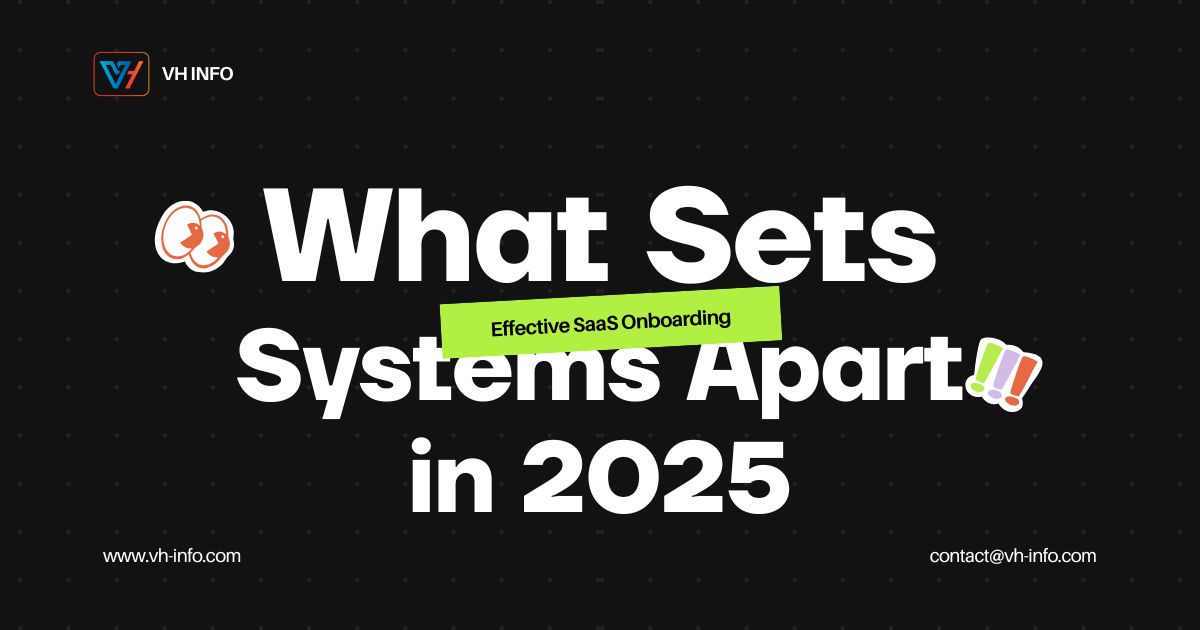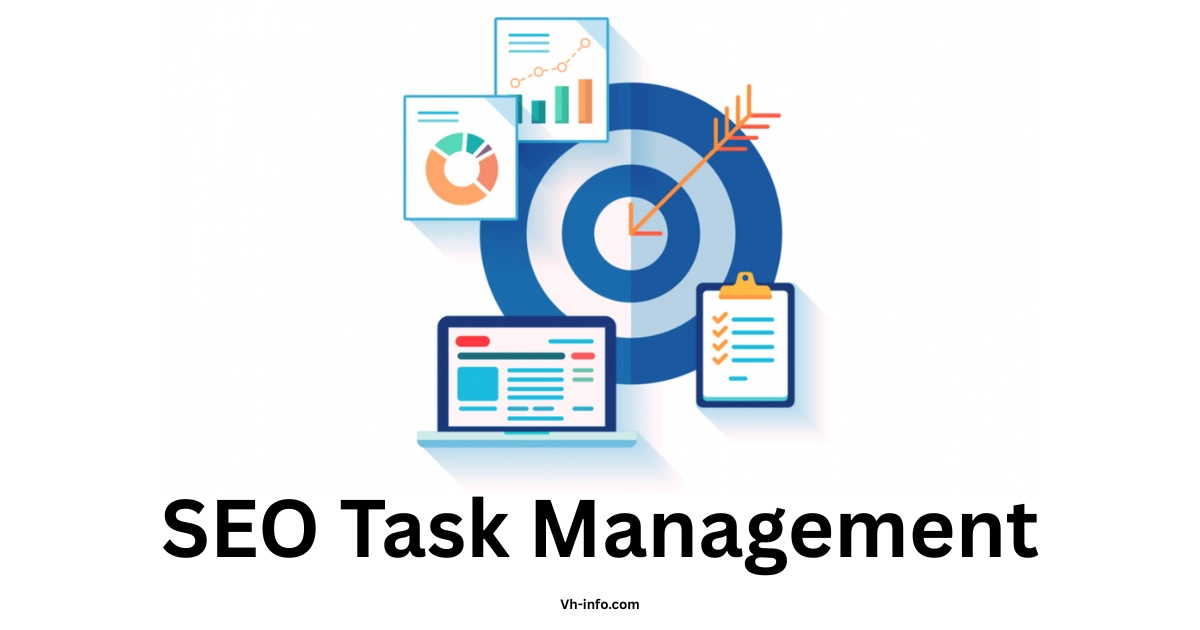In today’s hyper-connected world, establishing a strong online presence is crucial for businesses of all sizes. But with the vast array of digital marketing channels and tactics available, navigating the landscape can feel overwhelming. Two prominent players in this arena are digital marketing and social media marketing. While they share some similarities, understanding their distinct features and how they work together is essential for crafting an effective marketing strategy.
- Digital marketing: The global market is estimated to reach a staggering $686.3 billion by 2024, according to Statista. This growth is fueled by the increasing adoption of digital devices and the ever-growing online population.
- Social media marketing: With over 4.6 billion active users worldwide, social media offers a massive platform for brands to connect with their target audience. Social media marketing spending is expected to reach $151.5 billion in 2024, highlighting its significant role in digital strategies.
What is Digital Marketing ?
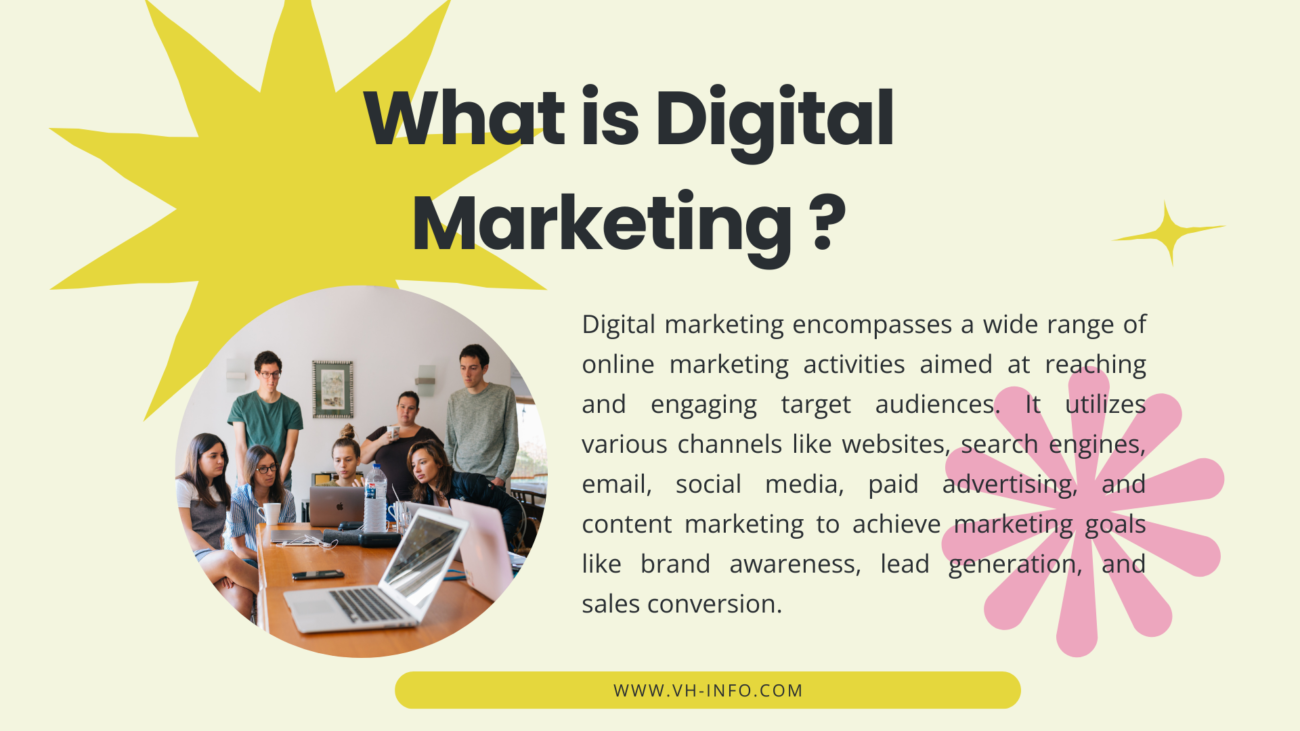
Digital marketing encompasses a wide range of online marketing activities aimed at reaching and engaging target audiences. It utilizes various channels like websites, search engines, email, social media, paid advertising, and content marketing to achieve marketing goals like brand awareness, lead generation marketing, and sales conversion.
Top Digital Marketing Tools 2024
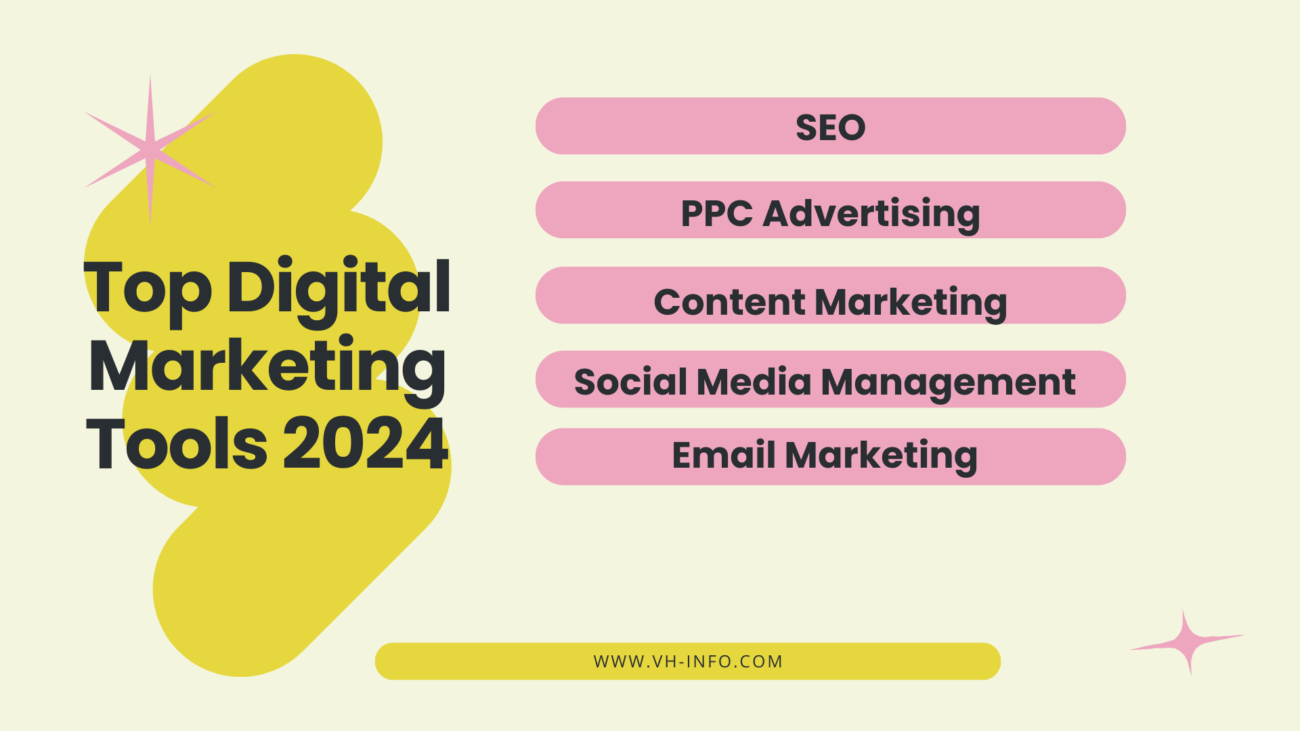
Search engine optimization (SEO):
Search engine optimization (SEO) is the process of improving the quality and quantity of website traffic to a website or a web page from search engines. SEO targets unpaid traffic rather than direct or paid traffic.
- Drives organic traffic: Improves website visibility in search results, leading to free, qualified visitors.
- Boosts brand awareness: Increases online presence and strengthens brand authority.
- Targets specific audiences: Optimizes content for relevant keywords, attracting ideal customers.
- Improves website user experience: Enhances website structure and navigation, boosting engagement.
Top SEO Tools : Ahrefs, SEMrush, and Moz help optimize websites for search engines, improving organic visibility.
Pay-per-click (PPC) advertising:
Pay-per-click (PPC) advertising, also known as cost-per-click (CPC) advertising, is a digital marketing model where advertisers pay a fee each time someone clicks on their ad. It’s a targeted way to reach potential customers who are actively searching for specific products or services online. Here’s a breakdown of its key aspects:
- Delivers fast results: Reaches targeted audiences quickly with paid ads on search engines and websites.
- Tracks performance precisely: Measures ad clicks, conversions, and ROI accurately.
- Targets specific demographics and interests: Reaches ideal customers based on detailed criteria.
- Complements SEO: Can boost the visibility of high-value pages even before they rank organically.
PPC Ad Platforms : Google Ads and Bing Ads enable targeted advertising campaigns to reach specific audiences.
Content marketing :
Content marketing is a strategic approach to creating and distributing valuable, relevant, and consistent content to attract and retain a clearly defined audience, ultimately driving profitable customer action. It focuses on providing informative, educational, or entertaining content that resonates with your target audience rather than directly promoting your products or services.
- Attracts and engages audiences: Creates valuable content that informs, educates, and entertains target customers. For example, you can have a look at Lyfefuel ‘s website to see how much information the company provides its audiences.
- Builds thought leadership: Establishes your brand as an industry expert, fostering trust and credibility.
- Generates leads and sales: Captures audience interest and guides them through the buyer’s journey.
- Improves organic ranking: High-quality content can attract backlinks and improve SEO performance, especially when using the right keywords. Moreover, you should also use different variations of your keywords to leverage your content and optimize your SEO strategy like Acon24.
- Top Tools for Content Marketing : HubSpot, WordPress, and Mailchimp offer tools for creating, managing, and distributing engaging content. enhance the credibility of your content, it’s essential to showcase customer feedback. For instance, WordPress allows you to easily add testimonials to WordPress, helping to build trust with your audience and improve engagement.
Social media management
Social media management encompasses the planning, creating, scheduling, analyzing, and engaging with content on various social media platforms to achieve specific marketing goals. It’s crucial for reaching audiences where they spend most of their time online and building meaningful relationships with them.
- Builds brand communities: Fosters engagement and relationships with customers on their preferred platforms.
- Increases brand awareness: Expands reach and visibility through social media interactions and sharing.
- Drives traffic to your website: Uses social media platforms to direct qualified leads to your website.
- Tracks brand sentiment: Monitors online conversations to understand customer perception and improve marketing strategies.
Top Tools for SMM: Hootsuite, Buffer, and Sprout Social help schedule, publish, and analyze social media content.
Email marketing
Email marketing involves sending targeted, commercial messages to a list of subscribers who have opted-in to receive them. It’s a powerful tool for building relationships, nurturing leads, promoting products or services, and driving sales.
- Nurtures leads and builds relationships: Connects directly with prospects and customers through personalized emails.
- Drives targeted campaigns: Segments audiences and sends relevant content based on specific interests.
- Converts leads into customers: Promotes offers, discounts, and other incentives to drive sales.
- Tracks performance effectively: Measures email open rates, click-through rates, and conversions to optimize campaigns.
Top Email Marketing Platforms: Mailchimp, Benchmark Email, Constant Contact, and ActiveCampaign facilitate email marketing campaigns and track their performance.
What is Social Media Marketing ?
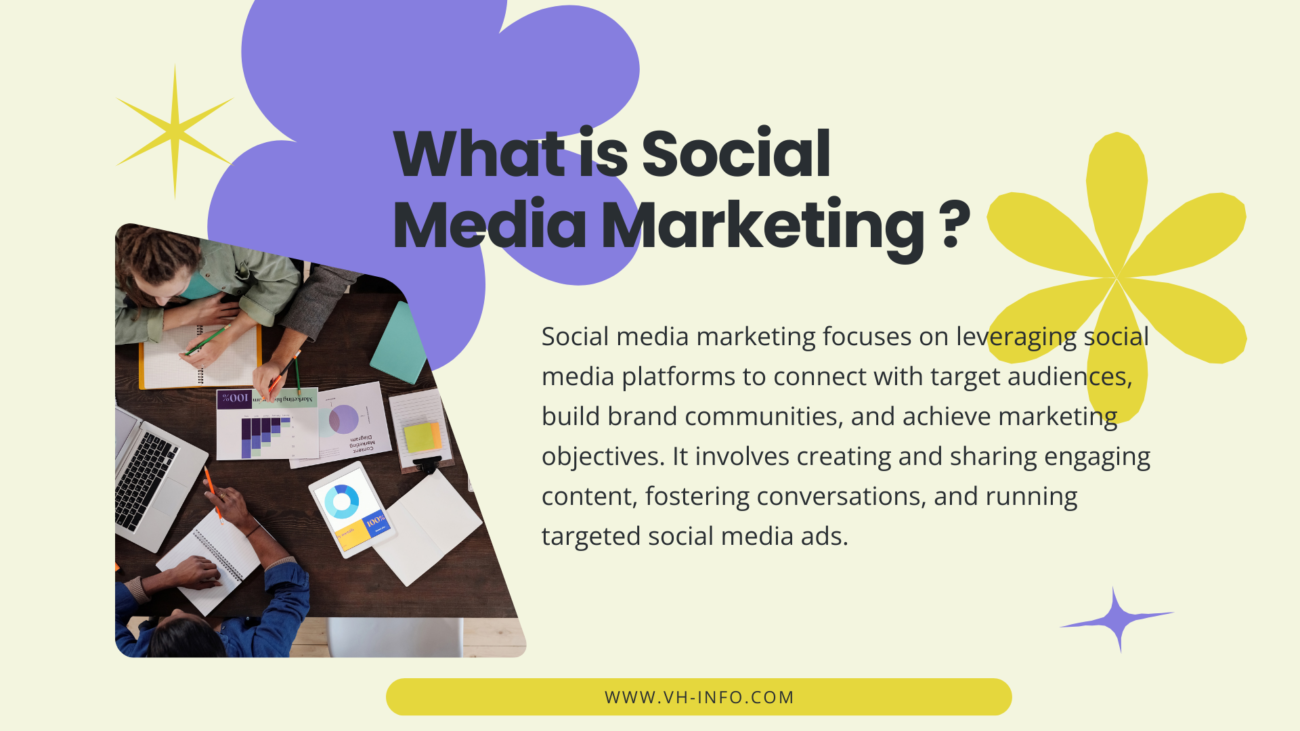
Social media marketing focuses on leveraging social media platforms to connect with target audiences, build brand communities, and achieve marketing objectives. It involves creating and sharing engaging content, fostering conversations, and running targeted social media ads.
Digital Marketing Campaign vs Social Media Marketing Campaign
Digital Marketing Campaign:
- Scope: Encompasses a wider range of online marketing channels and tactics, including:
- Search engine optimization (SEO)
- Pay-per-click (PPC) advertising
- Content marketing
- Email marketing
- Social media marketing
- Influencer marketing
- Affiliate marketing
- Display advertising
- Mobile marketing
- Goals: Can target various objectives like brand awareness, lead generation, website traffic, conversions, and sales.
- Strategy: Utilizes multiple channels and tactics in a coordinated effort to achieve the desired goals.
- Example: Launching a campaign to increase website traffic, using SEO, PPC ads, and targeted content across social media and email.
Social Media Marketing Campaign:
- Scope: Focused exclusively on leveraging social media platforms to achieve marketing goals.
- Goals: Often targets engagement, brand awareness, community building, customer service, and driving traffic to other digital channels.
- Strategy: Develops targeted content and utilizes paid advertising options tailored to each platform’s unique features and audience preferences.
- Example: Running a social media campaign on Instagram to promote a new product launch, using influencer partnerships, engaging content formats, and targeted ads.
Is digital marketing part of social media marketing ?
No, social media marketing is just one piece of the broader digital marketing puzzle. While social media plays a crucial role in modern marketing strategies, digital marketing encompasses a wider range of channels and tactics.
Pillars of Social Media Marketing

1. Content:
- Quality and Relevance: Create valuable, informative, and entertaining content that resonates with your audience’s interests and needs. Focus on quality over quantity.
- Variety: Utilize diverse content formats like text, images, videos, event photography, infographics, and live streams to cater to different preferences and attention spans.
- Consistency: Publish content regularly to maintain audience engagement and establish brand voice.
2. Community Building:
- Engagement: Respond to comments, messages, and mentions promptly and thoughtfully. Encourage conversations and foster a sense of community.
- Social Listening: Monitor online conversations about your brand, industry, and competitors to gain valuable insights and inform your content strategy.
- Brand Advocacy: Encourage customer testimonials, user-generated content, and brand mentions to amplify your reach and build trust.
3. Social Media Advertising:
- Targeted Reach: Leverage paid advertising options to reach specific demographics, interests, and locations with laser-sharp precision.
- Campaign Goals: Define clear campaign objectives like brand awareness, lead generation, or website traffic, and tailor your ad strategy accordingly.
- Budget Optimization: Set realistic budgets and track campaign performance to optimize spending and maximize ROI.
4. Analytics and Reporting:
- Key Metrics: Track relevant metrics like reach, engagement, click-through rates, and conversions to understand how your content and campaigns are performing.
- Reporting and Insights: With advanced analytics and reporting tools, analyze data to draw meaningful insights, identify areas for improvement, and refine your social media strategy.
- Benchmarking: Compare your performance with industry benchmarks and competitor activity to assess your relative position and identify best practices.
Advantages of Social Media Marketing
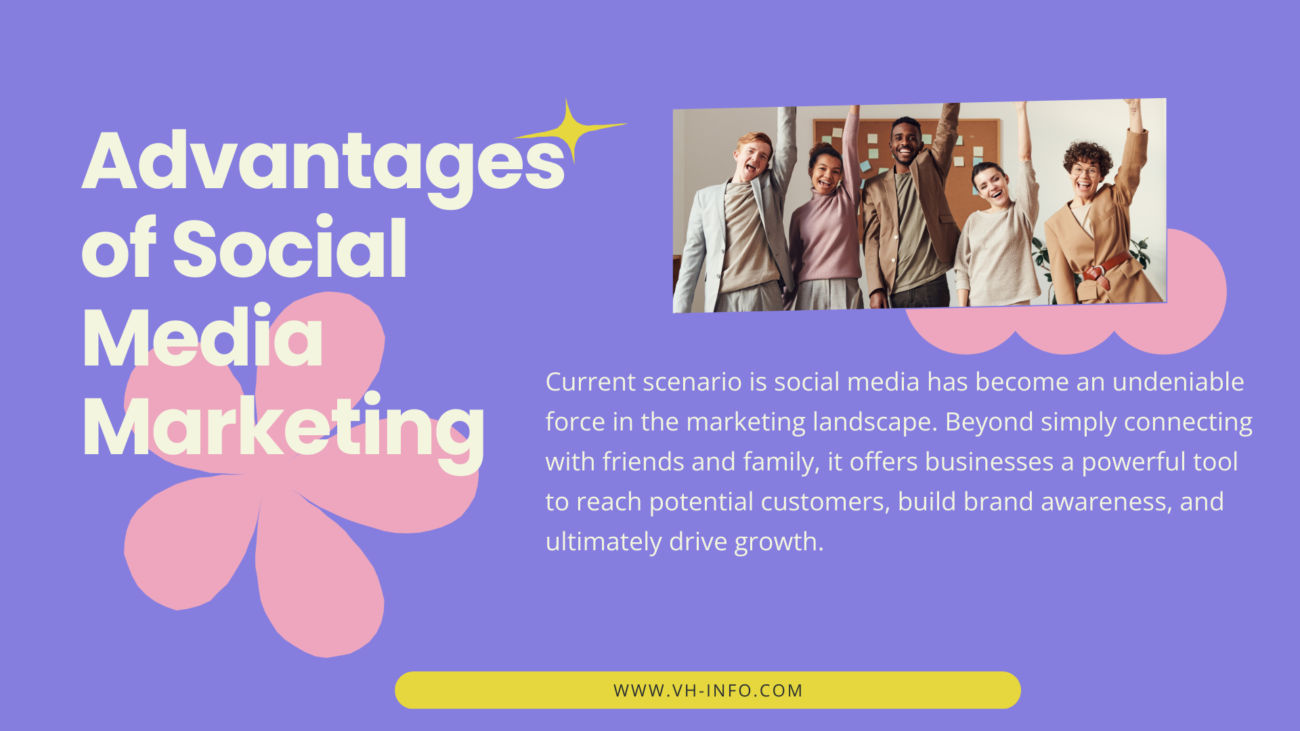
Current scenario is social media has become an undeniable force in the marketing landscape. Beyond simply connecting with friends and family, it offers businesses a powerful tool to reach potential customers, build brand awareness, and ultimately drive growth. Here’s a closer look at the key advantages of social media marketing:
1. Amplified Reach and Visibility:
- Access to a vast audience: With billions of active users across various platforms, social media grants access to a wider audience than traditional marketing channels.
- Target specific demographics: Leverage detailed targeting options to reach individuals with the right interests, age groups, and locations, maximizing marketing relevance.
- Viral potential: Engaging content can create a ripple effect, reaching large audiences organically through shares and likes, amplifying your message without additional costs.
2. Increased Brand Awareness and Engagement:
- Humanize your brand: Social media allows you to showcase your brand personality, values, and culture, fostering deeper connections with your audience.
- Two-way communication: Respond to comments, answer questions, and participate in conversations, building trust and loyalty with your customers.
- Community building: Create a space for interaction and feedback, attracting brand advocates and encouraging user-generated content.
3. Cost-Effective Marketing:
- Organic reach: Utilize organic content and platform features to reach a significant audience without incurring paid advertising costs.
- Targeted advertising: Compared to traditional advertising, social media ads offer precise targeting at a lower cost per reach, maximizing your marketing budget.
- Measurable results: Track key metrics like engagement, reach, and conversions to gauge campaign performance and adjust your strategy for optimal results.
4. Enhanced Lead Generation and Conversions:
- Drive traffic to your website: Utilize social media as a powerful tool to attract visitors and potential customers to your website or landing pages.
- Nurture leads through the sales funnel: Share targeted content and engage with interested individuals, guiding them towards conversions.
- Run targeted ad campaigns: Leverage lead generation ad formats to capture contact information and build your marketing pipeline.
5. Valuable Customer Insights and Market Research:
- Monitor brand sentiment: Gain insights into customer preferences, brand perception, and industry trends through online conversations and social listening.
- Identify target audience preferences: Analyze engagement data to understand what resonates with your audience and refine your content strategy accordingly.
- Competitor analysis: Monitor competitor activity and social media strategies to gain valuable insights and adapt your approach.
FAQs
Q1 : Social media marketing vs digital marketing which is better ?
A1 : According to vh-info.com The best effective approach often combines both digital marketing and social media marketing strategies. Each channel can support and amplify the other, creating a synergistic effect.
Q2: How effective is social media marketing statistics ?
A2: By implementing a well-crafted social media marketing strategy and regularly analyzing its performance, you can harness its potential to achieve your marketing goals and connect with your audience in powerful and meaningful ways.
Q3: What is the digital marketing strategy that tracks users across the web?
A3: It’s important to understand that tracking users across the web raises ethical concerns and privacy considerations. While certain methods can provide valuable insights, it’s crucial to prioritize user privacy and transparency.
Conclusion
As per research based on vh-info writer social media marketing vs digital marketing – which reigns supreme in the ever-evolving online arena? The right truth is, neither stands alone. In 2024, they tango, not duel, each fueling the other’s success.
Digital marketing orchestrates the grand performance, encompassing SEO, email, content marketing, and more, reaching audiences across diverse channels. Think of it as the broadcasting network, amplifying brand awareness and driving traffic.
Social media marketing takes center stage, fostering deep audience engagement through personalized content, community building, and influencer partnerships. Imagine it as the interactive theater, where brands connect directly with their fans.


